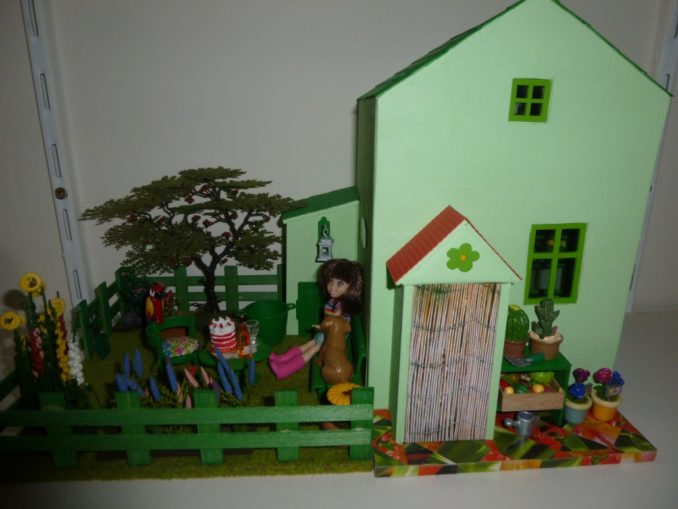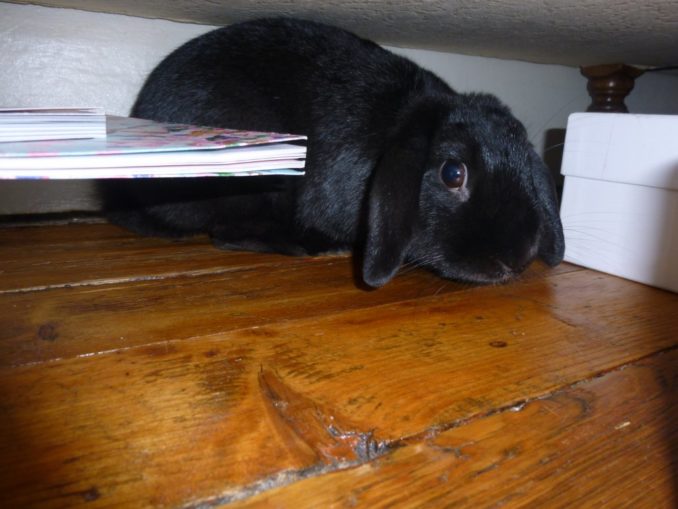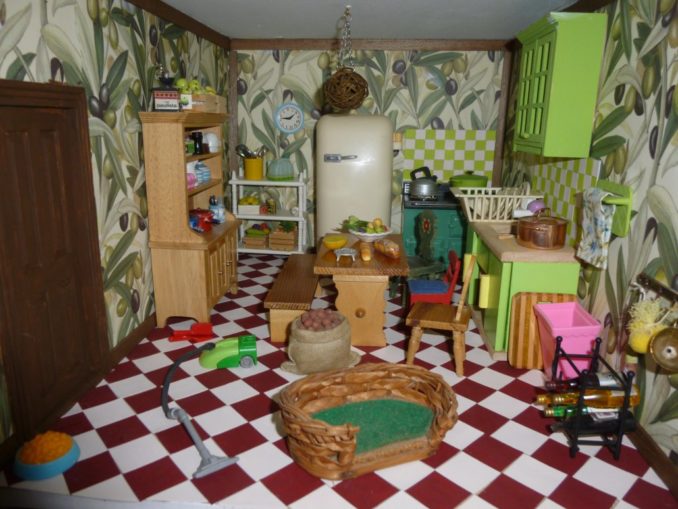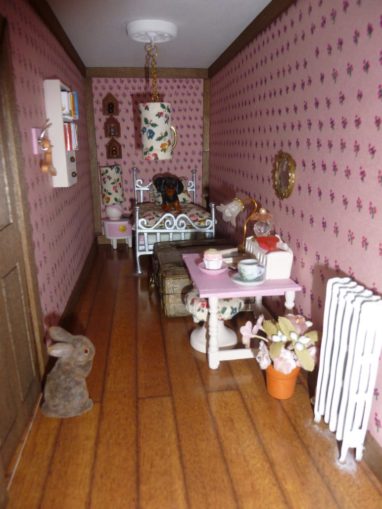
George parked his grey van fifty yards from Miss Rosie’s cottage, turned the engine off and waited. He had been watching the tiny house for three weeks now; he knew the old lady went out every Thursday at eight to have dinner with her friends at a nearby campsite pub.
Indeed, at precisely eight o’clock that evening, Miss Rosie wearing her maroon velvet hat with roses on the brim shut the garden gate behind her and walked briskly towards the road leading out of the village. George nearly spat in disgust at the sight of that silly hat; but he had no time to waste. He jumped out of his van, looked left and right, then ambled towards the cottage.
George had found out, among other things, that the old bat had a dog, had in fact seen her walking her old deaf cur more than once. George did not mind dogs or even cats, not that he would ever have had one considering his lifestyle. What he really hated were rabbits. Since childhood he had been severely allergic to them. His auntie had a white pet bunny when he was growing up and George had nearly died when he tried to pet it. He had spied on Miss Rosie long enough to be certain she did not own one of those varmints.
The old woman paid everything in cash, so George assumed she must keep a lot of it in her cottage, in her bedroom to be sure, her sort always kept their money close to their pillows, and, to crown it all, she was an easy target, the wooden door not secure, the lock old. George had made sure of everything. He had been a burglar as long as he could remember and though he had been in prison quite a few times he felt he was good at his chosen profession.

Gertrude was dreamily nibbling a delicious purple carrot (her favourite kind) when she heard an unusual sound at the door. Was Mum back already? That was strange: she was not due until three hours from now and never forgot anything. Also, the noise was not that of a key turning in the lock, but one that was new to Gertrude. Better safe than sorry, she thought, and hopped under the sofa.
Gertrude had been living with Mum for ten months now. She knew the cottage by heart. It was small: the front door opened onto a short hallway with the kitchen on the right and the parlour on the left. The staircase leading to Mum’s bedroom was at the rear of the hallway.
Gertrude heard a heavy tread proceeding precisely to the staircase. Hopping was the natural way Gertrude moved, but she could walk when she had to, especially when she intended to do something naughty without being heard. Silently she crawled from under the sofa all the way to the door which Mum always left ajar so that her pets could come and go as they pleased.
Gertrude peeked through the crack and, to her utter dismay, saw a large stranger tiptoeing up the stairs. At least once a week, Mum had friends to dinner, but Gertrude was sure she had never seen that man. And for some reason, she liked neither the look nor the smell of him.
Gertrude paused to wonder what she ought to do. She suspected the stranger’s was on his way to Mum’s bedroom for the only other room upstairs was the bathroom and that man was not the plumber, an old friend of Mum’s and fellow pet lover whom Gertrude knew well.
Gertrude thought hard. Her best friend Pops was upstairs right now, most likely asleep under Mum’s duvet. Pops was thirteen and had lately gone quite deaf. Just six months ago, Pops would have made an awful racket before the man even got to the cottage door. No chance of this now.
Gertrude went on observing the man who had now nearly reached the landing. Her uneasiness and distrust were growing by the minute. In two months’ time Gertrude would be two years-old. She had been living at the cottage for ten months. It was really heaven here and Gertrude intended to keep that way as long as she lived. She was not confined to a filthy cage for 23 hours a day like she had been at the other place. As for the rapists…
Ella, Gertrude’s previous owner, a woman much younger than Mum, had a passion for rabbits. But unlike Mum, she was careless and untidy. She kept her bunnies in her garage in cages which she cleaned every three months, if that. Worst of all, she was not careful about keeping young females separated from adult males. A group of feral scum had ganged up on Gertrude when she was just a few months old and subjected her to such indignities that she had nearly died of the resulting miscarriage. After her ordeal, Gertrude had developed a phobia of all things rabbit, stopped eating, and squeezed herself into a narrow corner of her cage. Finally, Ella had decided to get rid of her rather than the rapists and advertised on a dissident Telegram channel.
Gertrude had been petrified when she was brought to the cottage on a miserable November Sunday although she liked its smell from the very beginning. She mistook Pops for a rabbit and hid behind the toilet. But Mum was patient, kind, and reassuring. That very first day, she gave Gertrude a carrot the likes of which she had hitherto never tasted. Ella fed her rabbits nothing but insipid supermarket granules. Mum bought all her vegetables from Farmer Tom who grew them right here in the village so they were always crisp and Fresh. As for Pops, though somewhat uncouth at first, he proved a good egg in the end.
Gertrude snapped out of her reverie. The strange man had his hand on Mum’s bedroom’s door handle. Without a sound, Gertrude climbed the stairs and hid in a dark corner of the landing. Although he smelled different, the stranger for some reason reminded Gertrude of the rapists and she began to hate him.
What business did he have in Mum’s bedroom? Did he intend to hurt Pops, or lie in wait for Mum’s return? Gertrude shuddered. The intruder pushed the door open, seemed to sniff around the room, then walked directly to the old wooden chest where Mum kept those greasy pieces of paper which smelled of many people.
Gertrude saw the man kneel and start fiddling with the strong brass padlock. She padded into the bedroom and crouched behind the intruder. If she could just jump on to the bed, Pops would wake up and, seeing the stranger there, start barking. Perhaps she might pull the duvet with her teeth in order to alert Pops. But the distance to the bed was too great: the enemy would see her.

The stranger really had it in for the padlock, kept weighing, shaking it. He sat back on his haunches and seemed to ponder. Then he opened the shoulder bag he carried and fiddled inside. Gertrude intently watched his every move.
At last, the man took an dangerous-looking pick and inserted it into the lock. Gertrude waited with bated breath. Nothing happened. The intruder angrily stirred the pick a while longer then impatiently threw it back inside his tote which he again searched for a second tool, Gertrude assumed.
In a little while, he produced a set of old keys and a small file. It was at that precise moment that Gertrude understood. When she had first come here from the horrible place, she had done something very bad: Mum had invited half a dozen of her dissident friends for drinks and snacks. As they were talking, Gertrude caught sight of an alluring piece of bread on one of the guests’ plate. In a flash, she leapt and fled to the kitchen firmly carrying her booty between her two teeth.
“Thief!” Mum shouted, stamping her foot, whereupon she followed Gertrude, snatched the piece of bread from her mouth and threw it into the bin. Gertrude was ignored for the rest of the evening. She realised then that was she had done was very bad: she had not been hungry (in fact, she and Pops had been given their dinner just before the guests arrived), just greedy and bad. She had taken what was not hers just because she fancied it.
The intruder was now trying to do exactly the same. There was something he fancied inside the wooden chest, which he intended to take although it was not his and he probably did not really need it either. The man was a thief!
Anger suddenly filled Gertrude’s whole body. How dare that stranger come into their house uninvited and help himself to their property?
The man was still kneeling in front of the trunk rattling the stubborn, opinionated old padlock. His bewilderment and frustration were obvious to Gertrude. He sweated greasily, kept looking from his wristwatch to the bed, and rummaged inside his bag in a frantic way.
At last, he extracted a pair of pliers so big and threatening Gertrude felt they could cut her in half. The enemy knelt again. Presently, Gertrude heard the padlock snap. A roll of fat, unwholesome flesh showed where the man’s sweater rode up his back. Gertrude closed her eyes, took a leap, and plunged her two strong, square teeth into the thief’s hip.
He screamed and turned round.
Of all the horrors in the world! A rabbit, even blacker than him.
George broke in hives and crashed to the floor with a noise worse than thunder. Pops at long last woke up, jumped off the bed and, seeing a stranger slumped on what he considered his floor, started barking, it seemed to Gertrude, like no dog had ever barked before, as if ten thousand church bells suddenly rang together.
Phil and Marjorie, Miss Rosie’s next door neighbours, started worrying the minute they heard George collapse.
“Call the police, Phil!” cried Marjorie.
“Shouldn’t I go and take a look first?” asked her husband.
“Just don’t,” screeched Marjorie. “Can’t you hear that noise? Miss Rosie’s gone to the Andrei Sakharov’s and some sadist’s sneaked in there to torture her pets.”

Barely five minutes later, two police constables, dutifully followed by Phil and Marjorie, opened the garden gate. They found the cottage door open, the ground floor empty, and last but not least a stranger unconscious on Miss Rosie’s bedroom floor. George, a repeat offender in his mid forties, was not unknown to them.
The paramedics who examined the burglar told the police he had probably suffered anaphylactic shock as a result of pet hair allergy. It was his just deserts, they said, for breaking into pet owners’ houses. The thief was driven to Barnstaple hospital.
As soon as he was released, even though it had been determined that he had passed out from fright rather than anaphylactic shock, George went to the nearest police station and pressed charges against Miss Rosie for attempted murder with a deadly (or rather, rabbity) weapon.
Much to the village constable’s shame, Miss Rosie was arrested at her home and taken to Exeter prison. Brutal men in overalls caught poor Gertrude, locked her in an evil iron cage then drove her to the pound.
The same was intended for Pops, but the entire Andrei Sakharov Dissident Campsite assisted by three-quarters of the villagers picketed Miss Rosie’s cottage, thus actually preventing that vile abduction attempt. Our old friend Roger the Publican and his deputy, Simon Marmeladov, carried Pops back to the Andrei Sakharov pub surrounded by a crowd of incensed dissidents.
The authorities decided on an express trial. The appointed judge’s, Mrs. Justice Kate Hamite, reputation was well known up and down the country. A notorious Liberal (or let us put it honestly, a New Nazi), she was a personal friend of Pustula von der Scheissenhaus and recipient of fat envelopes from the philanthropist Geriatric Sorearse. As if this was not bad enough, this pleasant lady considered keeping pets of any kind a petty bourgeois habit to be eradicated at all cost.
Mrs Justice Kate Hamite would make sure Miss Rosie got fifteen years in prison without possibility of parole and Gertrude was put down.
After it was announced who would be presiding the trial, our old friend Dasia shut herself inside her flat on the top floor of the Aleksandr Zinoviev Dissident Building in Exeter and spent the evening thinking hard. She felt indifference towards Miss Rosie as she did to anyone she had not met in the Soviet Union, but she loved animals and, above all had a debt to Miss Rosie. You see, Miss Rosie had been Dasia’s mentor’s personal assistant, or rather secretary as it was called in those halcyon days. And Sir __ was one of those rare human beings Dasia actually liked.
At ten o’clock, Dasia stopped reflecting. She fired her computer and wrote carefully-worded emails to a number of carefully-selected organisations, the New Nazis’ stormtroopers which for several years had been terrorising the people of these islands into abject submission. Shortly before midnight, Dasia switched her computer off and went to bed, rather late for her, I must add.
As Dasia has surmised, the reaction to her exertions came swiftly. At midday, a group of blue-haired termagants, who pretended to protect women the better to enslave them, appeared on national television screeching that Gertrude was about to be put to death because she was female and a rape victim. The fascist government, they claimed, intended to legalise rape and execute victims.
At one clock, Bad Lives Matter wrote on the antisocial medium Bitter that Gertrude risked the death penalty because she was black, that, has she been a white rabbit, she would have been given a medal.
Yet another group, called Barmaids this time, declared that Gertrude clearly identified as a dog, therefore her arrest and looming death penalty were an attack on all trans creatures who, they claimed, shook and quaked huddled in their homes expecting death from all sides. That is, when they were not homeless. The horror that was murderous trans-phobia had to be quashed forever, they concluded.
For good measure, half a dozen activists marched into the Tate Gallery and threw cold tomato soup at in invaluable Victorian painting depicting a graceful little girl tenderly holding her pet rabbit. It was not clear in what way Gertrude’s arrest contributed, as they claimed, to climate change.
Finally, Antifart surrounded Exeter dog pound and threatened to set it on fire. Whether they would trouble to free the animals first, they never said.
By four o’clock that very afternoon, the whole country was up in arms. Pandemonium erupted outside Parliament, bottles and rotten vegetables were thrown at bewildered members, the crowd chanting, “free Gertrude. Free the raped rabbit.”
“Who’s Gertrude?” one MP innocently asked. The answer landed in the form of a not so fresh celery on his face.
A mob of angry citizen gathered outside Mrs. Justice Kate Hamite’s house (someone had leaked her personal address on the Internet), shouting insults and not so veiled threats.
Meanwhile, no one spared a thought for poor Miss Rosie, a tiny 62 year-old lady, who was at present languishing in jail and forced to share a cell with John-Joanna, a six foot five transgender woman who had killed seven people, although I would be dishonest if I did not inform my beloved readers that otherwise misguided John-Joanna had taken an immediate liking to its new cellmate and declared itself its staunch protector.
The six o’clock news called in no uncertain terms for the government to resign over the scandal.
That night an emergency cabinet meeting was convened. Needless to say, it had already been agreed that, even though the business had gone quite out of hand, the regime’s guard dogs would be ordered to put a sock in it, Gertrude destroyed, and Miss Rosie suicided in prison.
Still, it remained to be decided how best to spin this to the plebs.
Everyone was in a bad mood. After all, those personages have better things to do than discuss the future of an old bat and her pet bunny. Especially at night.
At five to eleven, the health minister, a particularly malevolent character who had been leafing through the case file for want of something better to do, tapped his cigarette lighter on the table to call everyone to attention.
“Bloody hell! Have you seen whose secretary the old woman was?” he cried, his teeth chattering.
The prime minister snatched the sheet of paper from his hand, took a quick look, and went chalk-white. A dead silence fell over the smoked-filled room. For more than twenty years years, Miss Rosie had been Sir _’s secretary, protégée, and, in all but name, the daughter he had never had. Worst of all, Sir_ now 101 years of age and long retired was still pretty alert.

“So what?” might my esteemed readers quite reasonably ask.
The answer is that for many decades Sir_ had been the head of a branch of the Civil Service whose business it is to know everything about everyone. And Sir_ was old school. And had photographic memory.
As the cabinet members dreaded, the phone rang just before midnight.
“Get me that fat albino Turk of yours,” boomed Sir_’s voice on the other end.
The prime minister’s hands shook so badly he nearly dropped the receiver several times. All he could mumble between his chattering teeth was, “Yes, Sir. Yes, Sir.”
For form’s sake, an experienced (a polite way to say elderly) judge was appointed the following morning to re-examine the case. He too was old school.
“Can you believe this nonsense?” he asked his wife handing her the file when she brought him a cup of tea.
“I can believe anything from that lot,” the shrewd lady answered.
So many people had gathered outside Exeter Crown Court that the police had to clear the road. As the mood outside was volatile, Miss Rosie was made to leave through the back. Dasia, Roger and Simon drove her straight to the pound before taking her, Gertrude, and Pops back to the cottage. A dozen fellow dissidents followed in vans or on scooters. One never knew in that day and age.
Miss Rosie was awarded a hefty sum in compensation, some of which she gave our friend Ida the interior designer to do the cottage up. The rest she donated to the British dissident cause.
George was never charged with burglary. Men in suits snatched him from his flat at dawn and without uttering a single word put him on a plane to Kingston. George’s ticket was one way.
It was late afternoon at the cottage when the doorbell rang. Miss Rosie got off the sofa to open the door. Gertrude, still a little anxious, followed. Farmer Tom stood on the threshold holding a wooden vegetable tray.
“Good evening, Miss Rosie,” Tom said. “I’ve brought the carrots you ordered. The yellow ones, the rainbow ones. And, of course, the purple ones.”
© text & images except where indicated Doxie 2023



